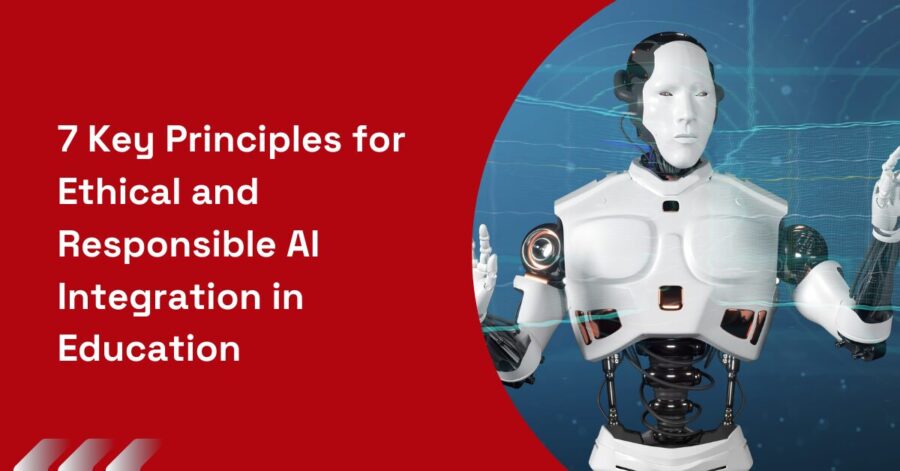5 November 2024
5 minutes read
7 Key Principles for Ethical and Responsible AI Integration in Education

Key Takeaways
- AI in education must prioritize transparency, data privacy, and inclusivity to support responsible use by students and teachers.
- Schools should provide guidelines for AI usage, ensure unbiased and accessible tools, and continuously monitor AI systems for improvement.
- Educators and students benefit from AI literacy, empowering them to use these tools ethically and to enhance personalized learning experiences.
AI is quickly altering our methods of instruction and learning. Students adopting AI to assist with their schoolwork is one of the most obvious effects. A lot of students use AI programs as virtual assistants to help them with things like hard math problems, translating fast, and coming up with ideas for compositions. Although this makes things easier, it brings up an important question: how can schools make sure that using AI is moral and responsible? This paper looks into seven key ideas that schools should use to make AI a useful tool in the classroom.
1. Transparency and Accountability
Transparency is the first ethical artificial intelligence principle applicable in education. Should students use artificial intelligence for assignments, they should be aware of when and how AI solutions apply. Teachers also have to know about the capabilities and restrictions of artificial intelligence.
Someone has to be responsible for how AI is used in learning settings for it to be accountable. For students to make sure they don’t cheat on their work, there should be clear rules about what to do if they use AI to help them finish a job. Schools need to set rules for how to use technology properly and make sure that people who make tools with AI also follow social standards. This way, schools can be sure that the tools are made with student safety in mind.
2. Teacher Empowerment and Collaboration
Integration of ethical artificial intelligence involves empowerment of teachers, not replacement of them. AI takes care of boring tasks like grading tests and keeping an eye on how students are growing, giving teachers more time to do what they do best: teach. But for this to really grow, teachers and coders who work with artificial intelligence need to work together.
AI as a Support, Not a Replacement
Knowing when and how to use AI tools will help teachers be better prepared to use them. AI can improve lectures and provide students new tools without sacrificing individualized instruction. AI should also be seen by teachers as a tool that adds to their job, not as something that takes it away. When teachers use EduBrain, they can add online AI support to help them with boring jobs, so they can spend more time talking to students in person. Not only teachers need this assistant, but also students can check their work here or get homework help from AI that provides free and affordable educational support. By freeing up teachers from doing boring tasks, AI helps them focus on creating more creative and personalized lessons. This way, AI helps keep the human element of teaching at the center of the learning process.
3. Data Privacy and Security
Data privacy is yet another absolutely crucial issue. A lot of the time, when students use AI to learn, their personal information is collected and used. Schools must make sure that private data is kept safe by blocking any unauthorized access or use. Parents and kids need to make sure that private information like grades, personal information, and learning patterns stays private.
If schools use AI systems, they need to make sure they follow strict data rules so they don’t break laws like GDPR or COPPA. You have more than one choice when it comes to keeping student data safe. This is an important part of building trust in AI systems. Data leaks and misuse are less likely to happen when security rules are strict. This keeps identity theft and other bad things from happening.
4. Inclusivity and Accessibility
AI ought to be a bridge rather than a wall. any students—from any backgrounds, ability, or economic level—should have access to these tools if ethical AI integration is to take place. For students with language problems or learning disabilities, an AI-powered system can be a game-changer since it helps them understand ideas in ways conventional approaches cannot.
Guaranturing Fair Availability of AI Tools
Schools have to close the digital divide by making sure that every student—not just those with means—has access to AI tools. This could entail granting underrepresented groups access to tools or running specific initiatives. Inclusivity also indicates that AI systems should be built to fit various learning styles and needs, therefore enabling everyone to get more individualized and efficient education.
5. Bias Mitigation
Biases in artificial intelligence are one of its main difficulties. Unchecked, artificial intelligence can support and spread already ingrained prejudices. Some students may thus be unfairly assessed or given recommendations based on faulty algorithms. An artificial intelligence grading essays, for instance, can favor one writing style over others, therefore disadvantageing pupils from many cultural backgrounds.
Developers must so teach artificial intelligence systems using varied data sets reflecting a broad spectrum of viewpoints in order to avoid this. Schools should keep close eye on AI outputs in order to find and fix any indications of bias. Teachers who commit to justice can help to guarantee that artificial intelligence stays an equalizer rather than a cause of inequality.
6. Continuous Monitoring and Evaluation
AI applied in education is not a set-it-and-forget technology. Maintaining its efficacy, fairness, and safety need for ongoing observation. As a way to see how artificial intelligence is changing students’ learning and performance, schools should give regular tests. This will help figure out what parts of AI systems need to be improved and developed so they can better meet the needs of kids.
Most importantly, comments from parents, teachers, and kids are still coming in. AI success is looked at on a regular basis, which helps institutions adapt to changing technology and educational needs. Artificial intelligence systems will get smarter, more accurate, and more in line with moral standards as they keep getting better.
7. Ethical AI Literacy for Students and Educators
Both teachers and students need to understand what artificial intelligence is, how it works, and what the moral implications are for using it in the classroom. This means adding knowledge about artificial intelligence to the course. It is important for students to know that AI is not perfect, so they should learn both how to use AI and how to judge what it does.
They should also learn about the moral issues that arise with AI so that they can guide their students in making smart use of these tools. This kind of learning will help everyone learn, and society can use it to promote smart AI use. You need to know how to deal with AI’s complexity if you want to get the most out of it and keep its bad effects to a minimum.
Conclusion
AI can revolutionize education, so improving its relevance, personalization, efficiency, and engagement qualities. But with this possibility also duty. Seven simple ideas can help schools use AI in a way that is good for everyone: being open, protecting data, including everyone, reducing bias, giving teachers more power, keeping an eye on kids all the time, and teaching them how to be responsible. As we move into this new age of technology, AI should always be seen as a tool that helps people learn, not one that makes it harder or less useful. AI can be a friend that helps people decide the future of education if they use it in a good way and plan ahead.
FAQs
Why is fairness important in educational AI?
Fairness is crucial to prevent bias and discrimination in AI systems, which can affect students’ learning opportunities. Ensuring diverse and representative training data helps mitigate these risks
How does transparency contribute to ethical AI use in education?
Transparency builds trust among educators, students, and stakeholders by clarifying how AI systems function and make decisions, ultimately fostering a responsible educational environment
What role does accountability play in the ethical use of AI?
Accountability ensures that there are clear responsibilities assigned to individuals or organizations involved in the design, implementation, and management of AI systems, addressing potential harms or errors that may arise
How can educational institutions ensure inclusivity when using AI?
Institutions should prioritize the development of AI systems that incorporate accessibility features and support diverse learning needs, ensuring that all students benefit from technological advancements
What are the risks associated with data privacy in educational AI?
The use of AI often involves collecting large amounts of student data, raising concerns about privacy breaches, data security, and potential misuse of sensitive information
Why is it essential to develop ethical frameworks for AI in education?
Ethical frameworks provide guidelines that help educators and developers navigate the complex challenges posed by AI technologies, ensuring that their implementation aligns with societal values and protects students’ rights

You can study at top universities worldwide!
Get expert tips and tricks to get into top universities with a free expert session.
Book Your Free 30-Minute Session Now! Book a call now




























